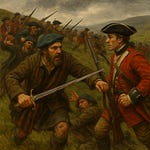Welcome back to "This Day in Scottish History." I'm your host, Colin MacDonald. Today, we journey back to the 16th century, to a remarkable event that unfolded on September 19th, 1582. On this day, John Craig, a Dominican-turned-Reformer, stood boldly against King James VI, delivering a public rebuke from the pulpit. Craig's actions, rooted in his deep conviction and commitment to the Scottish Reformation, sparked a significant moment in the evolving relationship between the Kirk and the crown.
So, who exactly was John Craig?
Born around 1512, John Craig's early life was deeply shaped by tragedy. His father died at the Battle of Flodden in 1513, a conflict that decimated Scotland's nobility. Craig pursued an education at the University of St. Andrews, where he may have witnessed the burning of early Protestant martyrs like Patrick Hamilton. These events likely sowed the seeds of his later religious convictions.
After graduating, Craig traveled to England, serving as a tutor in a noble family, but his life took a radical turn when he entered the Dominican Order in St. Andrews. His Dominican career took him to Bologna, Italy, where he quickly rose through the ranks, becoming the Master of Novices. However, it was here, amid the texts he was supposed to condemn, that Craig encountered the works of Protestant reformers, including John Calvin’s Institutes. This clandestine study transformed Craig’s theological outlook and led to his eventual condemnation by the Roman Inquisition. In 1559, he was sentenced to death for heresy.
Fate, however, had other plans for Craig. When Pope Paul IV died, civil unrest erupted in Rome. Amid the chaos, Craig managed to escape his prison cell the day before he was to be executed. He fled north, journeying through Vienna and London, before returning to Scotland in 1561. Upon his arrival, he aligned himself with the Scottish Reformation and quickly became a key figure, serving as a minister at Canongate Kirk in Edinburgh.
Craig’s influence grew over the years. He became a colleague of the famous reformer John Knox at St Giles' Cathedral and played a central role in drafting the Second Book of Discipline—a document that helped solidify the Presbyterian structure of the Church of Scotland.
Now, let’s turn back to the pivotal event of September 19, 1582. John Craig had been appointed one of James VI’s royal chaplains. This put him in a delicate position—preaching to a king with whom he often disagreed. On this day, Craig took a bold step that would have far-reaching consequences. From the pulpit, he openly criticized a proclamation issued by James VI, one that Craig deemed offensive to the clergy. His words were direct and unflinching, causing the young king to weep in public.
This was not an isolated incident. Craig had previously taken stands that demonstrated his courage. Most famously, he had denounced the scandalous marriage of Mary, Queen of Scots to James Hepburn, Earl of Bothwell, in 1567. Craig refused to proclaim the banns of marriage without protest, publicly listing the charges of adultery, kidnapping, and suspicion of murder against Bothwell. Although the marriage went ahead, Craig's defiance marked him as a reformer who would not bend to royal will when it conflicted with his conscience.
Craig’s stance on September 19, 1582 reflected a broader tension between the Church of Scotland and the crown. His belief, like that of many other reformers, was that kings were not above God’s law. His rebuke of James VI was not just about a single proclamation—it was about the right of the church to challenge royal authority when necessary. Craig and his fellow reformers firmly believed that the church, not the monarchy, should have ultimate authority in spiritual matters.
This conflict between church and state would continue to shape Scottish history for decades, culminating in the National Covenant of 1638 and the eventual Wars of the Three Kingdoms. Craig’s actions on this day in 1582 were a reminder of the crucial role the Kirk would play in defending the rights of the people and the sovereignty of the church.
John Craig’s legacy didn’t end with his public confrontations with royalty. He was a prolific writer and thinker. His Short Summe of the Whole Catechisme, published in 1581, became a popular teaching tool within the Scottish Reformation. He also had a hand in writing the King’s Confession, which would later serve as a foundation for the Covenant of 1638.
Craig continued to serve the church until his death in 1600, at the age of 88. His life, marked by dramatic escapes, theological battles, and unwavering commitment to the Reformation, stands as a testament to the power of conviction and courage.
As we reflect on September 19, 1582, we remember a day when one man stood against the most powerful figure in Scotland, not with force or rebellion, but with the spoken word—a reminder that in the Reformation, it was often the voice of the preacher that carried the most weight.
Thank you for joining us on This Day in Scottish History. I’m your host, Colin MacDonald, reminding you that the past is never far behind us, and the courage of figures like John Craig still resonates today. Haste ye back for our next episode!













Share this post